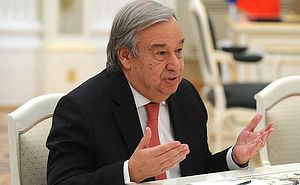UN Secretary-General Antonio Guterres is making his first foray to Central Asia as the international organization’s top diplomat starting on June 8 and ending June 13. Guterres’ processor, Ban Ki-moon, visited Central Asia in 2010 and 2015.
It is not Guterres’ first trip to the states of the region. In his role as UN High Commissioner for Refugees (UNHCR) — a position which he held for a decade ending in 2015 — he made a visit Kyrgyzstan and Kazakhstan in 2007, Tajikistan in 2008, and Turkmenistan in 2012. He did not visit Uzbekistan, which had closed the UNHCR office in Tashkent in 2006.
A trip through Central Asia presents an opportunity for Guterres to touch on a multitude of critical global issues.
Guterres will start his Central Asia tour in Kazakhstan, where he is scheduled to meet with President Nursultan Nazarbayev and give a speech at the Shanghai Cooperation Organization summit. Kazakhstan is more than doubling down on its aspirations to be viewed as a global player. The Kazakhs are certainly hosting enough dignitaries and delegations in the next week. Astana will host a pivotal SCO summit June 8-9, where India and Pakistan are anticipated to join (finally) as full members. On June 10, the much-ballyhooed EXPO 2017 opens in the capital city and the next round of Kazakh-hosted Syrian peace talks are slated for June 12-13.
On June 10 Guterres is expected in Samarkand, Uzbekistan, to meet with President Shavkat Mirziyoyev. Mirziyoyev has made serious efforts in changing the tone of Uzbekistan’s external relations. First focusing on the country’s immediate neighbors and then international institutions — like the EBRD and the UN’s human rights body — Mirziyoyev’s initiatives have been broadly welcomed. Like Ban Ki-moon in 2015, Guterres will make the pilgrimage to the ruins of the Aral Sea.
The next day, Guterres will travel to Bishkek to meet with Kyrgyz President Almazbek Atambayev. He is then scheduled to travel to Osh, “where he will attend a commemoration of the June 2010 events,” according to Stéphane Dujarric, the Secretary-General’s spokesperson. In June 2010, after the Second Kyrgyz Revolution simmering ethnic tensions between Uzbeks and Kyrgyz in southern Kyrgyzstan boiled over. The UN’s human rights bodies have called repeatedly for a reckoning and for the release of political prisoners, like Azimjon Askarov, detained in the wake of the violence. Many in the human rights community will be hoping Guterres will push the issues in his talks with Atambayev.
Next, Guterres will travel to Dushanbe, Tajikistan to meet with Emomali Rahmon and attending a conference on sustainable development. Dujarric said the Secretary-General would then visit “areas affected by climate change.” Environmental volatility, experienced through increased glacial melts and resulting floods and landslides, for example, are a serious risk in Central Asia, especially mountainous Tajikistan and Kyrgyzstan.
In Turkmenistan on June 13, the final stop, Guterres will meet with President Gurbanguly Berdimuhamedov and participate in “a high-level UN Central-Asian dialogue on implementing the UN Global Counter-Terrorism Strategy in Central Asia.” The strategy is constructed around four points: tackling the conditions conducive to the spread of terrorism, preventing and combating terrorism, building countries’ capacity to prevent and combat terrorism, and to strengthen the role of the United Nations system in that regard, and ensuring respect for human rights for all and the rule of law while countering terrorism. The final point is a sore spot in Central Asia.
We can expect Guterres to touch on important, but relatively comfortable topics, like climate change and regional cooperation. These are issues the UN and the states of Central Asia can discuss with ease. More difficult topics, like human rights, can expect a mention but not a public airing many activists would like to see. Behind closed doors is where Guterres could make progress on issues like political prisoners — especially in Uzbekistan and Kyrgyzstan –but we’ll have to wait to see the results.

































